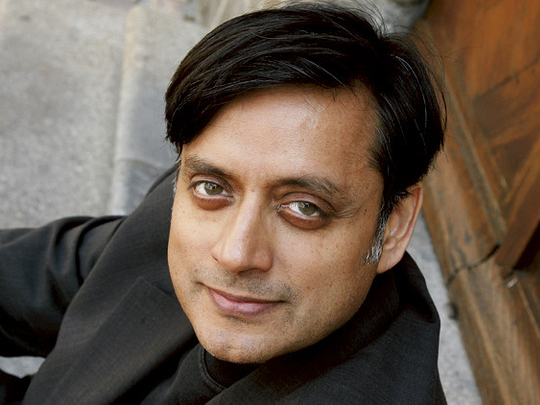
When I first met Shashi Tharoor in the summer of 2006, he was at the peak of his campaign for the office of United Nations secretary-general. Despite a punishing schedule, he agreed to a half-hour interview with me — a rookie journalist fumbling through his first interview for a nondescript e-zine. And yet, entirely to his credit, he was as gracious and charming as could be.
I suspected that his indulgence had much to do with his own experiences as a young journalist. Writing for Youth India magazine as a college student, Tharoor once interviewed India’s then-prime minister Indira Gandhi at her Safdarjung Road residence in New Delhi. Thirty years later, in his spacious office at UN headquarters, he was on the other side of the microphone.
I’d asked him then if Indian politics was an option he had given much thought to.
“I was tempted, but realised I didn’t have the right background. I didn’t have a poor man’s rural constituency, and neither was I a maharaja or an industrial scion. In India, the educated, salaried classes go into diplomacy because there is no feasible political life for us,” he noted wryly.
When he swept into the Lok Sabha in 2009, many rejoiced at the prospect of ushering in a new era of young, educated and accomplished politicians. They expected a man like him to raise the bar of probity in the shadowy world of Indian politics. Yet, right from the start, Tharoor struggled with the Congress party’s old-world ways. Some alleged that his superstar-status in the media and his immediate elevation to the Cabinet irked many old-timers, who felt upstaged.
And yet, despite several false starts, he seems to have held on to the trust of the party top brass. If Rahul Gandhi is truly uninterested in the top job, as he has said himself, that effectively creates a political opening in the party. Many imagine that Tharoor would be the Congress party’s best choice to put forward as a prime ministerial candidate. Others rubbish the notion, and dismiss him as a political greenhorn with a penchant for the media glare. Moreover, they argue, 10 Janpath would balk at having him steal the top job from more senior party loyalists.
Tharoor, however, is not a man of the masses and suffers from poor visibility outside of the urban, English-speaking classes. His core support comes from the educated, professional sections of India who have always dreamt of an international leader who can conduct himself impressively and speak flawless English, a modern-day Nehru if you will. To them, Tharoor provides deliverance from the rustic — and often frustrating — alternatives that India offers.
To paraphrase the columnist Santosh Desai, in a country where education and erudition is, for some peculiar reason, associated with ability and morality, Tharoor might be able to mount an effective campaign within his party — and later against the opposition candidate — provided he can see off his other rivals within the Congress.
The most serious of these contenders, former finance minister Pranab Mukherjee, has effectively excluded himself from the race by choosing to occupy Rashtrapati Bhavan instead. However, he still faces another formidable and experienced opponent with both the ambition and the political connections to gun for the Congress Party’s nod — the present finance minister, P. Chidambaram.
Corporate India would easily warm to the idea of the pro-business technocrat, Chidambaram, moving into the top job. Many pundits viewed his latest Budget speech as, essentially, him laying out his prime ministerial credentials to business, special interests and urban voters. He is seen by many as a tough and efficient administrator who can effectively balance corporate demands with the populist compulsions of the Congress Party’s electoral strategy. However, he has been no stranger to controversy — with his name figuring among the accused in the 2G scam, despite being later acquitted by the Supreme Court. Moreover, it is said that his haughty attitude has not won him as many friends in the party as he would like.
Indeed, cold political calculations may work in favour of these two leaders from the South. As Pranay Gupte, a senior journalist, recently speculated, the Congress may do well to hatch a “southern strategy” as its prospects in India’s northern areas continue to wane. Offering a prime ministerial candidate from Tamil Nadu or Kerala may rally public opinion and votes in the populous southern states, entice more southern allies to join the coalition, and allow the United Progressive Alliance (UPA) to hold onto power.
Tharoor, however, seems to have two advantages over the likes of Chidambaram and A.K. Antony: First, as a relative newcomer to the political scene, he carries less of a confrontational political history and less reputational baggage. That would make him an ideal compromise candidate between warring allies. Second, with his diplomatic skills and erudite manner, he offers the UPA a strong and respected figure on the international scene.
It may be a far cry but, as many will attest; Indian politics has certainly seen stranger happenings. Seven years ago, I’d also asked Tharoor what he’d like to see changed in the Indian political system.
“We have a number of leaders who have, frankly, very poor credentials to exercise, including many with criminal charges against them. And there’s unfortunately an enormous amount of corruption in our politics. Something needs to be done about that.”
Indeed, it does.
Rakesh Mani is a columnist and writer, focused on development and policy issues. Follow him on Twitter: @rakeshmani









